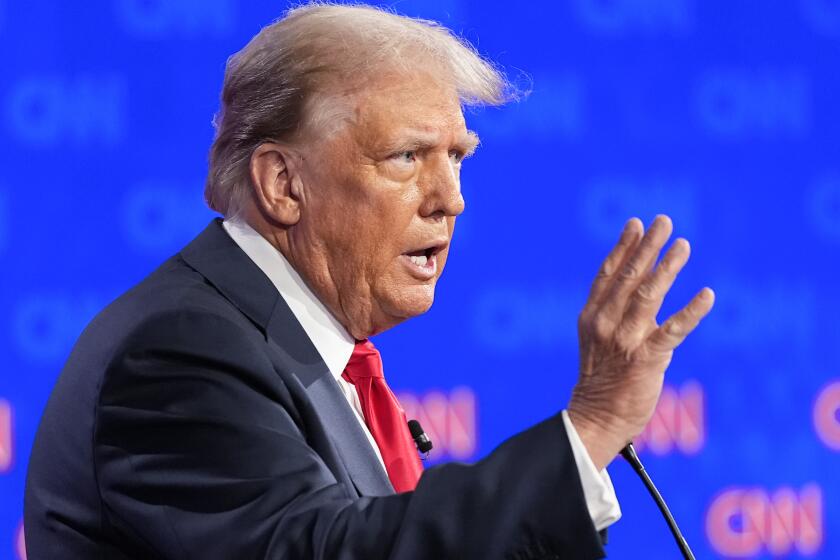One Sees Stonewalling, the Other Grandstanding
Under pressure from Washington, the United Nations says it would like to reform itself and rebuild ruptured ties with the United States. But this week, the U.S. relationship with the U.N. seemed to be summed up by one thing: an empty witness chair.
At a Senate hearing on the Iraqi “oil-for-food” program Tuesday, Sen. Norm Coleman (R-Minn.) called on the world body’s oversight chief, Dileep Nair, to testify. He didn’t appear.
Coleman, who heads the Permanent Subcommittee on Investigations, saw it as another instance of U.N. stonewalling. He has led calls for Secretary-General Kofi Annan to step down because of corruption in the $64-billion humanitarian program.
“I’m saddened that the U.N. did not see fit to allow Mr. Nair to appear today despite assurances from the U.N. that it would cooperate closely with our investigation,” Coleman said at the hearing.
To the U.N., the no-show reflected an earnest but unsuccessful effort to be helpful. Although U.N. officials are not allowed to testify under oath, Annan’s office had promised to send a different official in charge of audits to brief the Senate committee, but he was out of the country Tuesday.
“The chair was empty because of the grandstanding of the committee staff, not because of the U.N.,” said Mark Malloch Brown, Annan’s chief of staff.
U.N. officials have begun to defend the organization from U.S. critics who accuse it of allowing then-President Saddam Hussein to siphon off billions of dollars from the U.N.-run program.
Leading the charge is Malloch Brown, head of the U.N. Development Program. His assignment, he says, is to help wrench the United Nations out of crisis, save Annan’s job and get the world body back on track.
“We can’t allow ourselves to be trapped in the bunkers of oil-for-food when we have huge crises out there like Darfur and the tsunami and what just happened in Lebanon,” he said this week.
Malloch Brown launched a charm offensive in Washington last week, meeting with the world organization’s harshest critics, including Coleman and the chairmen of four other congressional committees investigating the oil-for-food scandal. He said that Annan’s office would allow access to documents and U.N. employees but that he couldn’t open the doors to every investigator. New policies have been put in place to make the U.N.’s bureaucracy more transparent, Malloch Brown said.
Most of the lawmakers who met Malloch Brown said that he was persuasive but that they wanted to see more action. “I thought that he was a charming man, and I thought his message was unacceptable,” Rep. Dana Rohrabacher (R-Huntington Beach), told the New York Sun after his visit. “You can’t charm yourself out of this one.”
Coleman said that he had been reassured by Malloch Brown’s promises and that he had offered to allow nine U.N. officials who were invited to testify to maintain their diplomatic immunity during the hearing.
“I had good conversations with him last week and we talked about cooperation,” Coleman said. “But in the end, there’s an empty chair.”
Timothy E. Wirth, president of the U.N. Foundation, a group funded by billionaire Ted Turner to promote the world body, said Annan’s Cabinet needed to learn how to confront political challenges.
“The empty chair is an old political ploy. I’ve used it myself,” said Wirth, a former senator from Colorado.
“There’s a lot of posturing going on one side and the U.N. has to learn how to respond to that,” he said. “They have to seize the moment to show people how important the U.N. is in the world, and to the United States. And even if the other side is not particularly willing to listen, they have to show they are serious about reform.”
For now, though, the U.N. and Annan remain in the hot seat.
After Malloch Brown’s visit, two Republican lawmakers proposed legislation that would withhold U.S. funding for the U.N. until the world body enacted reforms to help prevent the kind of problems that contributed to the oil-for-food scandal.
Rep. Henry Hyde (R-Ill.), who chairs the House International Relations Committee, wrote to Annan saying his investigators were expanding their scrutiny of the United Nations beyond their oil-for-food case to the entire U.N. system.
The Bush administration also is increasing its pressure. State Department and National Security Council officials traveled to New York last week to discuss their ideas for U.N. reform, and urged the world body to accelerate its investigations of alleged sexual abuse by U.N. peacekeepers in Congo.
“We are pressing the U.N. to move as quickly as possible to get to the bottom of these charges and do everything in its power to make sure it doesn’t happen in the future,” a senior State Department official said.
With U.N. funding and perhaps his future at stake, Annan is reacting with tough new policies, including a ban on contact between peacekeepers and Congolese civilians.
But the most significant sign of change was the departure of several of his closest advisors, including Iqbal Riza, his former chief of staff, and Elisabeth Lindenmayer, his deputy chief of staff. Each had worked with Annan for more than a decade.
“It has been very difficult. Very difficult,” Annan told The Times. “But we are here to carry on.”
“This Cabinet has been unchanged for eight years. Some limited turnover is reasonable,” Malloch Brown said. “In any administration you freshen the team.”
Some U.N. officials say Malloch Brown is ready to work hard to restore the relationship with the United States.
“I’m very single-mindedly focused on the fact that the U.S.-U.N. relationship has to work,” Malloch Brown said. “It doesn’t have to be a romance, but it has to work.”
More to Read
Get the L.A. Times Politics newsletter
Deeply reported insights into legislation, politics and policy from Sacramento, Washington and beyond. In your inbox three times per week.
You may occasionally receive promotional content from the Los Angeles Times.










